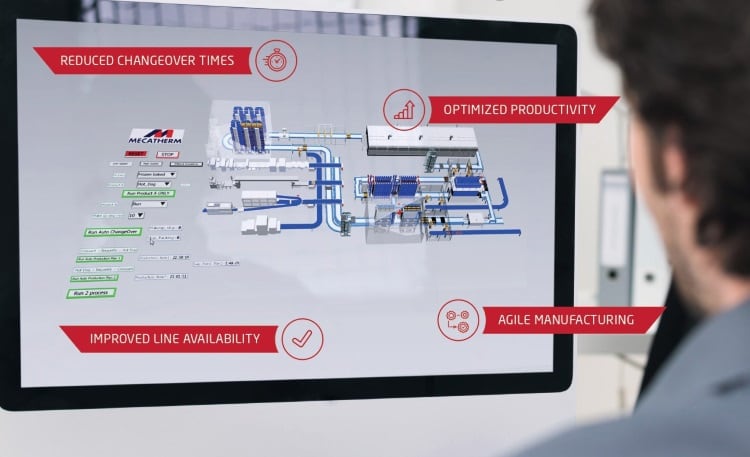“Digital information technologies have been emerging in the industrial sector for a few years now. But less quickly than in the mass market sector,” said Franck Ellenbogen, sales director, North America of Mecatherm, a French specialist in bakery production lines.
And yet, the bakery industry can't afford to miss out on such evolutions; they are truly imposed on it by consumers. It is now a matter of being innovative and proactive in anticipating new consumer trends. Indeed, NFC technologies, QR codes and augmented reality are now expected from retailers and consumers who would be surprised not to see these technologies at the service of their traditional Sunday croissant purchase.
Above all, these new technologies are an indispensable tool to be put in the hands, or at the fingertips, of the manufacturer.
Indeed, consumers' demands for diversity and the industrial challenges to meet them, such as flexibility and agility, seemed previously opposed, but digital tools can now reconcile these elements with ease. But, as Ellenbogen, said, “Agility cannot be declared; it is an attitude; it is a will. And if agility might seem simple, it is actually the result of a considerable work through your whole organisation, from the boss to the operator.”
An industrial baker therefore needs to integrate into their manufacturing process the flexibility and immediacy that new technologies allow. For the designers of industrial manufacturing lines, these expectations have become requirements and innovations have become a must-have.
The advent of these new technologies in the industry has given name to what is usually called Industry 4.0.
Mass customisation
According to Max Blanchet, MD of Accenture Strategy, the entire paradigm of industrial strategy has been transformed. For him, “the industry is moving from a logic of mass production to one of mass customisation. It is no longer based on scale and volume effects, but on flexible, localized production close to demand. It manufactures "on demand" and no longer builds up stocks, marking a dynamic adaptation to demand. It is more predictive, self-correcting and produces more accurately on the first try.”
From design to maintenance, not to mention the handling and operation of the production lines, digital solutions are ubiquitous and provide manufacturers the adaptability and versatility they now need.
First, setting up manufacturing lines has a cost. A material and a human one. The project must therefore be thought out beforehand, leaving nothing to chance. The bakery industry is complex and involves various technologies, assembling them intelligently and in accordance with the industrialist's project is a job in itself.
Thanks to 3D technology and virtual tour, it is now possible for the manufacturer to really go through their installation in all its details by simply wearing a virtual reality headset. It is not only a fascinating device; it is a precious tool that allows to go from concept to reality at a lower cost and without risk. In a similar fashion, operators can be trained in the efficient and safe use of production lines with these digital tools. Indeed, nowadays, if you can fly an airliner or drive a Formula 1, it is also possible to operate an industrial production unit in a simulator.
But once the equipment is set up, the design and planning work is not finished. To stay ahead of the game and meet consumer demands, the manufacturer must be flexible and be able to change production quickly without unnecessary extra costs. Here, too, technology makes it possible to simulate the planned manufacturing sequences and thus considerably optimise production, for example, with the help of a planning software application. Such tools give industrial companies the freedom to innovate while preserving a secure investment, two priorities for a viable economic model.
Only thing the same is change
The number and kinds of recipes and products are constantly changing in the bakery world. Without the valuable support of digital tools, the operation of production lines would be increasingly complex.
Paradoxically, it is quite the opposite today since the central controls displayed on monitors with intuitive and high-performance interfaces, precisely allow operators to have easy access to all these parameters very easily. Also, maintenance, which is part of a manufacturer’s day-to-day business, should not distract them from their core business and the freedom to innovate.
Precise and immediate diagnosis that can pinpoint the exact origin of a breakdown or defect must be accessible at all times, for instance through a mobile monitor that gives the location of the fault, the cause and recommendations for repair, along with any parts that may need to be changed.
New technologies are giving manufacturers the opportunity to rethink their business in our new world. The main issues at stake are the best possible use of resources, flexibility and agility, as well as the regionalisation of production and innovation. These elements are quite naturally the principles of action for a manufacturer who puts customer needs at the heart of their strategy.
Finally, these technologies enable an economic logic of new value creation by generating it through increased use of a product or solution.

